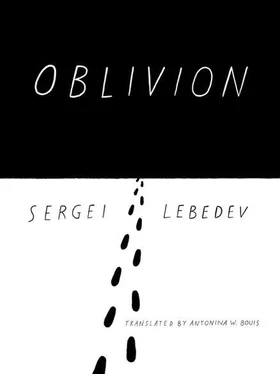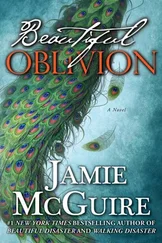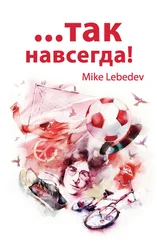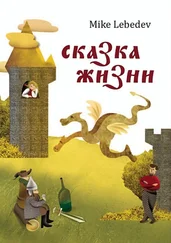For this place, the local past did not exist; the residents were not miners but factory managers, they had forced out the former owners on Red Kolkhoz Street and planned their own, separate neighborhood free of mine dust, and the times were such that you could change the name from the straw and manure Red Kolkhoz to Rainbow. Actually, you could gauge the attitude toward the past by the name change: moving into new apartments—this was during perestroika—people were moving into the future, they called it Rainbow, and even though they couldn’t get paint in the entire rainbow spectrum, they could set themselves apart, legalize their caste, and probably no one saw that the neighborhood looked like a dollhouse in a filthy wasteland.
Beyond the last buildings there was one more, a village house, low, its shingles blue-gray with lichen; it had not been torn down for some reason. I went there—the house was from former times, it was the same age as the letters that were dropped into a mailbox around here by the man who wrote to Grandfather II.
An old woman was hilling potatoes in the garden; there are old woman like that—eighty, ninety years old, who lost their husbands a long time ago at war or in the mines, so long ago that others manage to live an entire life, from birth to death, in that period of time. The past—marriage, motherhood—is so distant that either the person or the past has to die, and if the person lives, the past dies. These old women are a special breed—they don’t get tired, life to them is a daily chore—dig, water, hill, weed; they harness themselves habitually and probably only for themselves, without hope, without expectation, without haste. After all, you get tired when the work is hard and rest is far away, but they truly do not understand the meaning of rest, and no work is hard for them because in order to sense its difficulty you have to know the meaning of idleness, which they have never experienced. They are not inspired to work—people like that eventually tire; they work like abstract forces in textbooks—they press, haul, accelerate, move; there is horsepower and there is human power—and that power alone is what keeps them alive.
I said hello; the old woman yelled at me to go away—she wasn’t going to sell the house. I replied that I didn’t need the house, I was looking for the people who lived here twenty years ago, before the new neighborhood. She unlatched the gate and led me into the house; she didn’t quite believe me and kept expecting me to start talking about buying, to name a sum, but there was something else as well that made her mood change so readily.
The house was a kingdom of hand-knit rugs, coverlets, and curtains: a sewing machine, an old Singer, stood in a prominent place and it seemed that the old woman had gotten a magical spool with never-ending thread; she sewed, spun, knitted, and never ran out of thread, and she did not know what to do with it, but she was afraid to turn off the machine and spindle or put down her knitting needles: What if the thread was her life?
A framed newspaper clipping hung on the wall, wreathed in paper flowers, an atheist shrine; that clipping—the woman started telling me about it—determined her fate. There she was in the photo, a young weaver, the only one in the entire town to have ever personally seen the Bolshevik in whose honor the town was named, and she was even photographed with him; he received a delegation of shock worker weavers and they brought her, a girl, as an example of youth labor; then the Bolshevik was killed, and she moved to the place bearing his name—and in this town the newspaper clipping served to ensure her well-being. While the town bore that name, the authorities—both Soviet and the ones who came after—took good care of her; the old woman—I was told this later—gave talks about the Bolshevik in schools and kindergartens, at municipal meetings and anniversaries; her own life was insignificant, she had become something like a film strip or a gramophone recording that captured the image and voice of the deceased; she did not embroider or invent things; she toiled as an eyewitness.
Yet no one thought to find out how she felt about the man for whose posthumous existence she had stifled her own life; it was only much later, in the new times, that they learned he had sent her parents to the camps; but she had continued talking about him, witnessing those eight minutes she had been next to him; first the newspaper clipping saved her from being sent away and turned her into a visual aid for schoolchildren; then she became an eight-minute segment of newsreel, and then she no longer could change.
Telling me about her past life, she spoke as if she sensed the time was coming when her newspaper clipping would mean nothing, no matter what the town used to be called; her house was standing thanks to that clipping, she was the only one who hadn’t been moved out of Red Kolkhoz Street, and now the framed newspaper wreathed in flowers looked more like an idol of a forgotten deity; the face, the font—they were all too long ago and it kept moving away, not forgotten but losing its meaning, turning into a curiosity, and if people learned that she had seen the man for whom the town was named, they were only surprised that she was still alive.
When she heard I was looking for someone, the old woman hoped I would bring changes, that an old relationship would be rekindled, time would turn back; but seeing that my interest was not in that, she seemed to regret letting me in; she said only that people from Red Kolkhoz Street were resettled in various places, these had been the oldest buildings in the town, and some had gotten good apartments in the center, in the Stalinist houses; apparently the managers of the factory had enough power to move out the former owners but had to humor the former higher officers of the camp guards; basically, that was the plan—to divide the town’s past from the town’s present, to separate so that it would be easier for some to forget the others.
I asked her some more about the town, where I could look for the people who moved, what they lived on now; the old woman told me to go the quarry—I would understand everything there, about the people who moved and the ones who didn’t; the quarry for her was an answer that obviated the very possibility of a question.
She, a former weaver, the guardian of someone else’s memory, who had lived a life different from the rest, protected by the newspaper clipping on the wall, replied as if I had asked her where her peers where, where her husband and children were and whether she had had any; where was her generation, what had it left behind, where were the survivors, the last ones, what could they tell me; “Go to the quarry,” she said and closed the door, then bolted it.
I walked through town again; I was just strolling, keeping the general direction in mind, and realized something I had noted but had no words to describe: the town was planned for people walking in columns and turning at right angles; a single person, a single dweller with irregular routes was apparently too minor for the planners’ focus, they lacked the vision to see the human figure through the plan; as a result, the city was divided up by plants and factories and the person—an ordinary person—seemed to be there illegally.
I saw how “zones,” walled off by fences and barbed wire, whether a prison camp or a closed, restricted enterprise, entered the public and private space and distorted it. In essence, the town as town did not exist—there was a territory on which private interests were permitted selectively, stores, schools, nurseries, but this was a necessary concession; things were not intended for humans here, and thus the locale resembled a beam chewed up by a wood borer; everything was illegal, crooked, roundabout, and under the table; cut this corner, move this board, go through the dump; across the lot, in the hole in the fence, and back alleys, alleys, alleys.
Читать дальше












